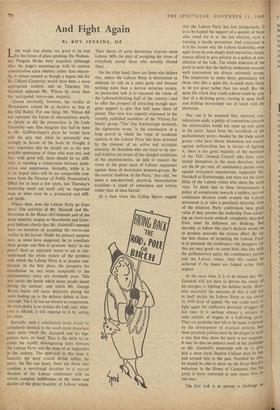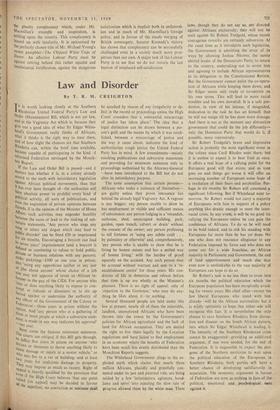And Fight Again
By ROY JENKINS, MP LAST week was almost too good to be true L./for the forces of plain speaking. On Wednes- day Penguin Books were acquitted (although after the judge's summing-up, with its curious concentration upon adultery rather than obscen- ity, it almost seemed as though a degree nisi for Sir Clifford Chatterley would have been a more appropriate verdict); and on Thursday lir. Gaitskell defeated Mr. Wilson by more than the anticipated two-to-one majority.
Almost inevitably, however, the verdict at Westminster cannot be as decisive as that at the Old Bailey. For one thing, Mr. Wilson did not represent the forces of obscurantism nearly so clearly as did the prosecution in the Lady Chatterley case. One imagines that had he been in Mr. Griffiths-Jones's place he would have told the jury that while he personally was strongly in favour of the book he thought it very important that he should act as the best possible spokesman of those who were not, and that, with good will, there should be no diffi- culty in reaching a compromise between publi- cation and suppression. Secondly, while it is to be hoped there will be no comparable non- sense from the Director of Public Prosecution's Office for at least a few years, last Thursday's leadership result can mark only an important stage in what must be a protracted and diffi- cult battle.
Where, then, does the Labour Party go from here? The activities of Mr. Shinwell and Mr. Silverman in the House of Commons and of the noisy minority claques at Manchester and Liver- pool indicate clearly that Mr. Gaitskell's enemies have no intention of accepting the two-to-one verdict in his favour. Ought his primary purpose now, as some have suggested, be to conciliate these groups and thus to promote 'unity' in the party? Such an approach seems to me to mis- understand the whole nature of the problem with which the Labour Party is at present con- fronted. In the first place, the prospects for conciliation on any terms acceptable to the parliamentary party are extremely poor. This was surely the lesson which many people learnt during the summer, and which Mr. George Brown learnt still more decisively during the week leading up to the defence debate at Scar- borough. The Left has no interest in compromise. Its main desire is to remain the Left, and, what- ever is offered, it will respond to it by asking for more.
Secondly, such a conciliatory move would be completely inimical to the much more important unity drive which Mr. Gaitskell and his sup- porters have on hand. That is the drive to re- create the rapidly disintegrating unity between the Labour Party and the mass of its supporters in the country. The approach to this issue is basically the most crucial divide within the party. On the one hand, there are those who combine a new-found devotion to a narrow decision of the Labour conference with an almost complete indifference to the views and desires of the greatb majority of Labour voters. Their theory of party democracy imposes upon Labour MPs the duty of accepting the views of everybody except those who actually elected them.
On the other hand, there are those who believe that, unless the Labour Party is determined to abdicate its role as a mass party and become nothing more than a narrow sectarian society, its paramount task is to represent the whole of the Leftward-thinking half of the country—and to offer the prospect of attracting enough mar- ginal support to give that half some share of power. This view was cogently expressed in the recently published manifesto of the 'Victory for Sanity' group. 'This' [the Scarborough decision], the signatories wrote, 'is the culmination of a long period in which the voice of moderate opinion in the Labour Party has been drowned by the clamour of an active and articulate minority. As Socialists who are loyal to its cen- tral tradition yet aware of the changed conditions of the nineteen-sixties, we seek to reassert the views of the great mass of Labour supporters against those of doctrinaire pressure-groups. By the central tradition of the Party,' they add, 'we mean a non-doctrinal, practical, humanitarian socialism—a creed of conscience and reform rather than of class hatred.'
At a time when the Gallup figures suggest that the Labour Party has lost (temporarily, it is to be hoped) the support of a quarter of those who voted for it at the last election, such a warning is hardly premature. And contained in it is the reason why the Labour leadership, even apart from its own deeply held conviction, simply cannot afford to give priority to a policy of con- ciliation of the Left. The whole structure of the party is such that the built-in tendencies towards such concessions are always extremely strong. The temptation to make them, particularly for those who like a quiet life, is much more likely to be too great rather than too small. But the quiet life which they could achieve could be only that of a declining party, turning in upon itself and drifting increasingly out of touch with the electorate.
Nor can it be assumed that, electoral con- siderations aside, a policy of concessions towards the unilateralists would not open up new splits in the party. Apart from the two-thirds of the parliamentary party—headed by the trade union group—who have shown themselves not merely against unilateralism but in favour of fighting it, there is the great majority of the members of the TUC General Council who have com- mitted themselves in the same direction; there are the 60 per cent. of constituency parties who, against everyone's expectations, supported Mr. Gaitskell at Scarborough; and there are the four- fifths of the Labour voters who share the same view. To think that in these circumstances a policy of compromise towards a sudden, narrow conference decision could re-unite the Labour movement is to take a peculiarly distorted view of the situation. Party conferences have great value if they prevent the leadership from adopt- ing an ivory-tower outlook completely detached from what its followers are thinking. But slavishly to follow this year's decision would be to produce precisely the reverse effect. By far the best chance of re-uniting the Labour Party is to persuade the conference—the prospects for this are very good—to conic back into line with the parliamentary party, the constituency parties and the Labour voters. And this cannot be achieved if the issues are fudged rather than argued.
At the same time, it is to be hoped that M. Gaitskell will not have to devote the whole of his energies to fighting the defence battle. How- ever successful the outcome of this, it will not in itself enable the Labour Party to rise above its 1959 level of appeal. No one could want to fight again the ineffective doctrinal struggles of last year. It is perhaps always a mistake to raise matters of dogma in a Left-wing party. They are probably best left to be made irrelevant by the development of practical policies. But these practical polices must be developed in such a way that they show the party is not stagnant. It may be that an indirect result of the challenge to Mr. Gaitskell's leadership will be to Wye him a more loyal Shadow Cabinet than he has had around him in the past. Fortified by this, he should be able to show, by the Front Bench's behaviour in the House of Commons, that bis party is more interested in new issues than in old ones.
The first task is to present a challenge to the ghastly complacency which, under Mr. Macmillan's example and inspiration, is settling upon the country. This complacency is bound up with insularity. It is epitomised by the perfectly chosen title of Mr. Michael Young's recent pamphlet—The Chipped White Cups of Dover. An effective Labour Party must be a gainst retiring behind this rather squalid and Insubstantial fortification, against the dangerous• isolationism which is implicit both in unilateral- ism and in much of Mr. Macmillan's foreign policy, and in favour of the steady merging of British sovereignty. Senator Kennedy's victory has shown that complacency can be successfully challenged even in a society much more pros- perous than our own. A major task of the Labour Party is to see that we do not remain the last bastion of misplaced self-satisfaction.















































 Previous page
Previous page